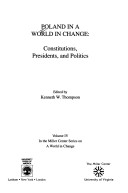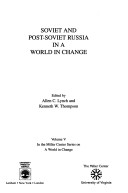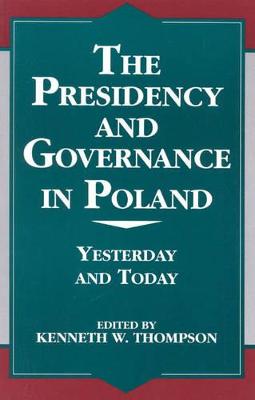The Miller Center Series on a World in Change
2 primary works • 5 total works
Volume 4
A timely explanation of change in the newly democratic Poland. Contributors include leading Polish and American scholars, two U.S. ambassadors to Poland, Lech Walesa's principal assistants and the leading U.S. scholar on Poland. Walter Osiatynski compares the American and Polish constitutions; Lech Falandysz traces the path from communist legality to the rule of law in Poland while Janusz Onyszkiewicz looks at the transition from totalitarianism to democracy. Taking on the presidency and politics in Poland, Leszek Garlicki asks if it is the wrong institutions or the wrong persons and Eugenuisz Piontek discusses challenges of the 1990s. Turning to Poland and American foreign policy, the U.S. Ambassador John R. Davis, Jr. looks at prospects for the future and Ambassador Richard T. Davies interprets changes in Poland and Eastern Europe. Andzej Korbonski provides the summing up with a look at changes overall in Eastern Europe. Co-published with the Miller Center of Public Affairs.
Volume 5
The Soviet and Post-Soviet Russia in a World in Change
by Kenneth W. Thompson
Published 22 February 1994
This work presents perspectives by experts during three different time periodsófrom 1989 to 1990, in 1991, and in 1992óillustrating the depth of the changes that have taken place in the former Soviet Union. Contents: Change in the Soviet Union: Political Dynamics in the Gorbachev Era; Gorbachev and Change in Soviet Foreign Policy; Reagan's Foreign Policy and Soviet-American Relations; The Rhetoric and Reality of Change in Soviet Domestic and Foreign Policy; The Soviet Union and Eastern Europe; What Went Wrong with Perestroika?; The Disintegration of the U.S.S.R. and American Foreign Policy; The Post-Soviet Economy and the World; The Influence of Political Culture on Government and Society; The Commonwealth of Independent States and the Post-Soviet Successor States; and Russia's Current Perception of America. Contributors: Paul B. Stephan, Joseph L. Nogee, Sterling J. Kernek, George M. Seignious II, Malcolm Toon, Marshall I. Goldman, Allen C. Lynch, Leonid I. Abalkin, Maurice Friedberg, Paul A. Goble, and Vladimir O. Pechatnov. Co-published with the Miller Center of Public Affairs.
New Thinking and Developments in International Politics
by Neal Riemer and Kenneth W. Thompson
Published 12 September 1991
This book explores the provocative question, 'What has been, and will be, the impact of new thinking and developments upon international politics?' The essays discuss the new possibilities resulting from new thinking. These are: the end of the Cold War and the advent of a peaceful, prosperous Europe closely tied to the United States; an invigorated United Nations; a shift of attention to the new challenges posed by patterns of violence in areas of the world divorced from the Cold War; and the prospect of global democratization and greater global economic and ecological health. Essays include: Implications of Soviet New Thinking for International Politics: Clues from Eastern Europe; Remodeling NATO and Europe: Continuity and Change in European Security in the 1990s; Toward a New and Invigorated United Nations; Violent Conflict in the International System of the 1990s; International Economics in the 1990s; Information Revolution and the Shaping of a Democratic Global Order. Co-published with the Miller Center of Public Affairs.
Contents: Europe: Integration or Fragmentation; East and West in Europe: New Walls or Integration?; Fortress Europe: Fact or Fancy?; Sweden and the New Europe; German and American Constitutionalism; Where Will German Unification Lead?; The New Germany and Europe; The Unification of Germany: Problems and Consequences; German Reunification: Price and Promise; A United Germany: An American Perspective; Governance and the New Europe. Contributors: Robert Rudney, Ambassador Berndt von Staden, Sir Peter Marshall, Ambassador Anders Thunborg, Ernst Benda, Robert Gerald Livingston, Alison T. Millett, Gunter Pleuger, Rebecca Hartley, Eamonn Gallagher. Co-published with The Miller Center.
The Presidency and Governance in Poland parallels the studies the Miller Center has produced on the American presidency and governance. It draws on the most able specialists on Poland, in the United States and Poland, who address issues that are central to any discussion of governance. Co-published with The Miller Center.



